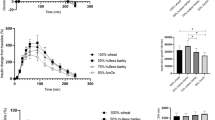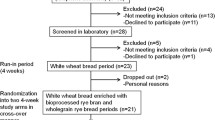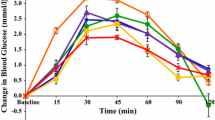Abstract
Background
Several factors can affect glycemic and insulinemic responses from cereal foods. Some suggested factors lowering the responses are; intact botanical structure, high amylose/high ß-glucan cereal varieties, organic acid produced during fermentation and food processes inducing retrogradation of starch.
Aim of the study
To evaluate the impact of fermented whole grain cereal kernels with high content of amylose (40%) and/or β-glucan (4.6%) on postprandial glucose and insulin responses in healthy adults.
Methods
Thirteen healthy volunteers (4 men and 9 women) were given 25 g available carbohydrate portions of: glucose solution; tempe fermented whole-grain barley and tempe fermented whole-grain oat. Blood samples were collected directly before the meal (fasting) and 15, 30, 45, 60, 90 and 120 min after the start of the meal. The GI (glycemic index) and II (insulin index) of meals were calculated for each subject according to FAO/WHO standards.
Results
Peak glucose response was lowest after the tempe meal with high-amylose/ high-ß-glucan barley tempe while insulin response was lowest after the meal with high β-glucan oat tempe. The mean blood glucose responses for both the barley and the oat tempe meals were significantly lower than from the reference glucose load (P < 0.0001) during the first 60 min. The calculated GI:s for barley and oat tempe were 30 and 63, respectively. Mean serum insulin responses from barley and oat tempe were significantly lower compared with the glucose load (P < 0.002) during the first 60 min, and the calculated II was lower for oat tempe (21) compared with barley tempe (55).
Conclusions
The results suggest that cereal products with beneficial influence on postprandial plasma glucose and insulin responses can be tailored by fermentation and enclosure of high-amylose and/or high-β-glucan barley and oat kernels.


Similar content being viewed by others

References
Ajithkumar A, Andersson R, Christerson T, Åman P (2005) Amylose and β-Glucan Content of New Waxy Barleys starch. Stärke 57:235–239
AOAC (1995) Total, soluble and insoluble dietary fiber in foods. In: Association of analytical chemists, official method 991.43. Official Methods of Analysis, 16th edn
Behall KM, Hallfrisch J (2002) Plasma glucose and insulin reduction after consumption of breads varying in amylose content. Eur J Clin Nutr 56:913–920
Behall KM, Scholfield DJ (2005) Food amylose content affects postprandial glucose and insulin responses. Cereal Chem 82:654–659
Behall KM, Scholfield DJ, Hallfrisch JG (2006) Barley [beta]-glucan reduces plasma glucose and insulin responses compared with resistant starch in men. Nutr Res 26:644–650
Bhathena SJ, Velasques MT (2002) Beneficial role of dietary phytoestrogens in obesity and diabetes. Am J Clin Nutr 76:1191–1201
Dunaif G, Schneeman BO (1981) The effect of dietary fiber on human pancreatic enzyme activity in vitro. Am J Clin Nutr 34:1034–1035
Eklund-Jonsson C, Sandberg A-S, Larsson Alminger M (2006) Reduction of phytate content while preserving minerals during whole grain cereal tempe fermentation. J Cereal Sci 44:154–160
FAO/WHO (1998) Carbohydrates in human nutrition. Report of a joint FAO/WHO expert consultation. Food and Nutrition paper 66:1–140
FAO/WHO (2003) Diet, nutrition and the prevention of chronic diseases: report of a joint WHO/FAO expert consultation. In: WHO technical report series vol 916
Granfeldt Y, Drews A, Björck I (1995) Arepas made from high amylose corn flour produce favorably low glucose and insulin responses in healthy humans. J Nutr 125:459–465
Granfeldt Y, Eliasson A-C, Björck I (2000) An examination of the possibility of lowering the glycemic index of oats and barley flakes by minimal processing. J Nutr 130:2207–2214
Granfeldt Y, Hagander B, Björck I (1995) Metabolic responses to starch in oat and wheat products. On the importance of food structure, incomplete gelatinization or presence of viscous dietary fibre. Eur J Clin Nutr 49:189–199
Granfeldt Y, Liljeberg H, Drew A, Newman R, Björck I (1994) Glucose and insulin responses to barley products: influence of food structure and amylose-amylopectin ratio. Am J Clin Nutr 59:1075–1082
Hallfrisch J, Facn, Behall KM (2000) Mechanisms of the effects of grains on insulin and glucose response. J Am Coll Nutr 19:320S–325S
Heaton KW, Marcus SN, Emmett PM, Bolton CH (1988) Particle size of wheat, maize, and oat test meals: effects on plasma glucose and insulin responses and on the rate of starch digestion in vitro. Am J Clin Nutr 47:675–682
Jenkins DJA, Kendall CWC, Augustin LSA, Franceschi S, Hamidi M, Marchie A, Jenkins AL, Axelsen M (2002) Glycemic index: overview of implications in health and disease. Am J Clin Nutr 76:266S–273S
Jenkins DJA, Wesson V, Wolever TMS, Jenkins AL, Kalmusky J, Guidici S, Csima A, Josse RG, Wong GS (1988) Wholemeal versus wholegrain breads—proportion of whole or cracked grain and the glycemic response. Br Med J 297:958–960
Jenkins DJA, Wolever TMS, Taylor RH, Barker H, Fielden H, Baldwin JM, Bowling AC, Newman HC, Jenkins AL, Goff DV (1981) Glycemic index of foods—a physiological-basis for carbohydrate exchange. Am J Clin Nutr 34:362–366
Juntunen KS, Niskanen LK, Liukkonen KH, Poutanen KS, Holst JJ, Mykkänen HM (2002) Postprandial glucose, insulin, and incretin responses to grain products in healthy subjects. Am J Clin Nutr 75:254–262
Liljeberg H, Björck I (1998) Delayed gastric emptying rate may explain improved glycaemia in healthy subjects to a starchy meal with added vinegar. Eur J Clin Nutr 52:368–371
Liljeberg H, Granfeldt Y, Björck I (1992) Metabolic responses to starch in bread containing intact kernels versus milled flour. Eur J Clin Nutr 46:561–575
Liu SM, Stampfer MJ, Hu FB, Giovannucci E, Rimm E, Manson JE, Hennekens CH, Willett WC (1999) Whole-grain consumption and risk of coronary heart disease: results from the nurses’ health study. Am J Clin Nutr 70:412–419
McKeown NM, Meigs JB, Liu S, Wilson PWF, Jaques PF (2002) Whole-grain intake is favorably associated with metabolic risk factors for type 2 diabetes and cardiovascular disease in the Framingham offspring study. Am J Clin Nutr 76:390–398
McKeown NM, Meigs JB, Liu SM, Saltzman E, Wilson PWF, Jacques PF (2004) Dietary glycemic index is related to metabolic risk factors in the Framingham offspring cohort. J Fed Am Soc Exp Biol 18:A871
Schulze MB, Liu SM, Rimm EB, Manson JE, Willett WC, Hu FB (2004) Glycemic index, glycemic load, and dietary fiber intake and incidence of type 2 diabetes in younger and middle-aged women. Am J Clin Nutr 80:348–356
Slavin J (2004) Whole grains and human health. Nutr Res Rev 17:99–110
Slavin J (2003) Why whole grains are protective: biological mechanisms. Proc Nutr Soc 62:129–134
Tappy L, Gugolz E, Wursch P (1996) Effects of breakfast cereals containing various amounts of beta-glucan fibers on plasma glucose and insulin responses in NIDDM subjects. Diabetes Care 19:831–834
Tovar J, Granfeldt Y, Björck IM (1992) Effect of processing on blood-glucose and insulin responses to starch in legumes. J Agric Food Chem 40:1846–1851
Wood PJ, Beer MU, Butler G (2000) Evaluation of role of concentration and molecular weight of oat beta-glucan in determining effect of viscosity on plasma glucose and insulin following an oral glucose load. Br J Nutr 84:19–23
Östman EM, Liljeberg Elmstahl HG, Björck IM (2002) Barley bread containing lactic acid improves glucose tolerance at a subsequent meal in healthy men and women. J Nutr 132:1173–1175
Acknowledgments
The authors would like to express their appreciation to Ingmar Börjesson and Lena Rimsten at Lantmännen Food R&D and Rickard Jonsson and Therese Christerson at Svalöf Weibull AB for their support and advice. This work was financed by VINNOVA Swedish Agency for Innovation Systems (Dnr 2004-02301).
Author information
Authors and Affiliations
Corresponding author
Rights and permissions
About this article
Cite this article
Alminger, M., Eklund-Jonsson, C. Whole-grain cereal products based on a high-fibre barley or oat genotype lower post-prandial glucose and insulin responses in healthy humans. Eur J Nutr 47, 294–300 (2008). https://doi.org/10.1007/s00394-008-0724-9
Received:
Accepted:
Published:
Issue Date:
DOI: https://doi.org/10.1007/s00394-008-0724-9



